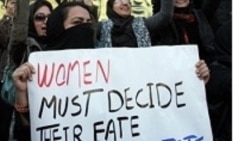The United States remains committed to a foreign policy that puts human rights and democracy at its center, said U.S. Ambassador to the United Nations Samantha Power during recent remarks at a National Democratic Institute’s Democracy Dinner.
That’s why the U.S. continues to be a strong supporter of democratic institutions, consistently stressing the value of independent civil society and media, equality for women and members of minorities, and fundamental human rights. The U.S. continues to work through bilateral and multilateral channels to counter the global crackdown on civil society, including by urging China and Russia to ensure that those with opposing views are free and safe to express those views.
The Middle East is no exception. “In Iran,” said Ambassador Power, “as we explore the potential for a diplomatic solution to the nuclear issue, we continue to press for the right of the Iranian people to express themselves freely, including on-line and through social media, just as their leaders now do.”
In Egypt, the U.S. has consistently supported the principle that all Egyptians should have the right to express their views peacefully. And in the case of Bahrain, the U.S. has underscored that long-term stability can only be achieved through national reconciliation and reforms that bring together all parties, including the government and opposition.
The United States’ diplomatic engagement in advancing democracy and human rights has led to significant gains for other parts of the world as well. U.S. engagement proved critical in facilitating the peaceful referendum that created South Sudan, it encouraged peaceful elections earlier this year in Kenya, and supported Burma as it started down the road to a democratic transition. Where transitions have been marred by strife, international peacekeeping efforts have helped to secure democratic gains in, among other places, the Balkans, Timor-Leste, Sierra Leone, Liberia, Cote d’Ivoire, and Mali.
Democratic change is not always smooth or without setbacks. But over time, U.S. interests are served by these processes and the foundations they create for more stable and more open societies. “As we champion democracy,” said Ambassador Power, “we never forget that America’s support for freedom is the cornerstone of our foreign policy and it’s our key to our standing in the world.”
That’s why the U.S. continues to be a strong supporter of democratic institutions, consistently stressing the value of independent civil society and media, equality for women and members of minorities, and fundamental human rights. The U.S. continues to work through bilateral and multilateral channels to counter the global crackdown on civil society, including by urging China and Russia to ensure that those with opposing views are free and safe to express those views.
The U.S. continues to work through bilateral and multilateral channels to counter the global crackdown on civil society.
In Egypt, the U.S. has consistently supported the principle that all Egyptians should have the right to express their views peacefully. And in the case of Bahrain, the U.S. has underscored that long-term stability can only be achieved through national reconciliation and reforms that bring together all parties, including the government and opposition.
The United States’ diplomatic engagement in advancing democracy and human rights has led to significant gains for other parts of the world as well. U.S. engagement proved critical in facilitating the peaceful referendum that created South Sudan, it encouraged peaceful elections earlier this year in Kenya, and supported Burma as it started down the road to a democratic transition. Where transitions have been marred by strife, international peacekeeping efforts have helped to secure democratic gains in, among other places, the Balkans, Timor-Leste, Sierra Leone, Liberia, Cote d’Ivoire, and Mali.
Democratic change is not always smooth or without setbacks. But over time, U.S. interests are served by these processes and the foundations they create for more stable and more open societies. “As we champion democracy,” said Ambassador Power, “we never forget that America’s support for freedom is the cornerstone of our foreign policy and it’s our key to our standing in the world.”






